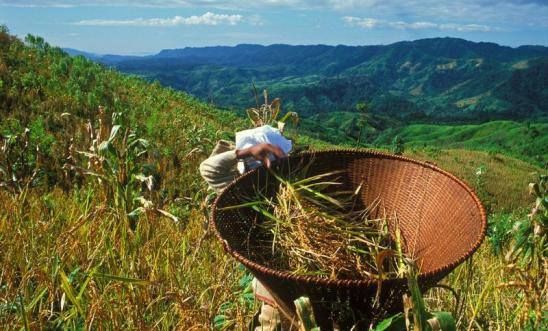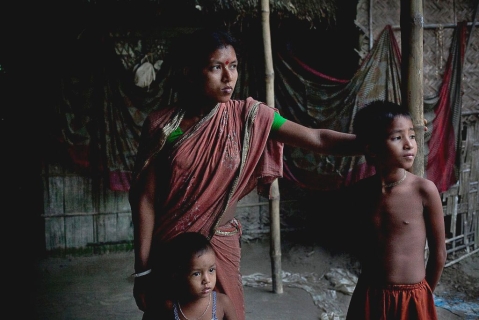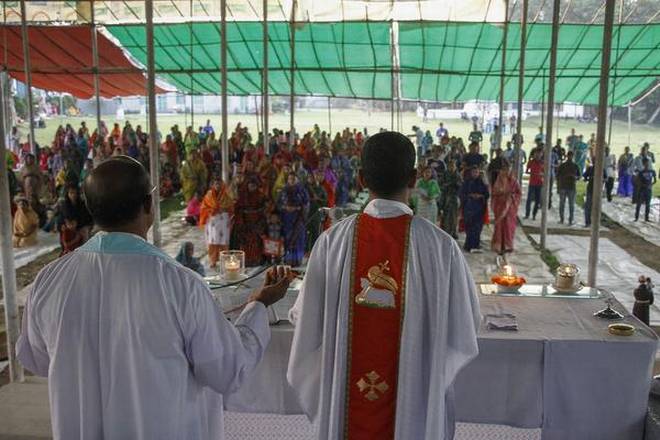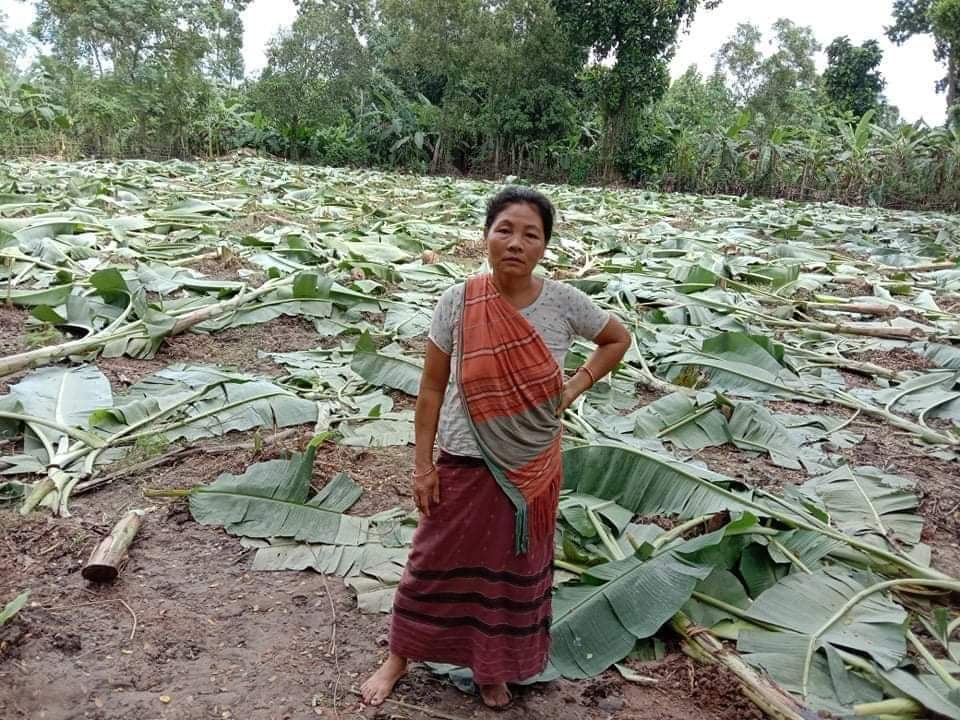-
The ill-treatment of Hindus and other religious minorities in Bangladesh continues as more than 50 cases of rapes, destruction of temples and other heinous crimes have been reported in this month alone.
September 2020 has been a particularly distressing month for religious minorities in Bangladesh; especially for Hindus and Buddhists in the Muslim-majority nation.
More than 50 cases of rapes, molestations, murders and physical attacks, looting of properties, desecration of temples, forced conversions and forcible occupation of lands have been reported this month.
According to Bangladesh Jatiya Hindu Mahajote, Bangladesh Hindu Janajagruti, Bangladesh Hindu Bouddha Christian Oikya Parishad and other bodies representing religious minorities in that country, the number of actual cases would be much higher since most cases, especially from the rural areas, are not documented due to fear of retribution by the majority Muslims.
August-end provided a indication of what was to come the following month (September): a series of random and uncoordinated attacks on Hindu houses and properties were reported from many parts of that country.
Though no one was injured in those attacks, the damage and loss to properties belonging to Hindus was substantial.
In the early hours of September 1, an indigenous Tripuri girl was lured into a ‘love jihad’ trap and gangraped by a gang of six Muslim young men at Bandarban district of Chittagong Hill Tracts.
According to this report in a local newspaper, the victim, a Buddhist, was lured by the promise of marriage by her Muslim paramour and taken to a jungle where she was gangraped. Her rapists are still at large.

That same night, another Buddhist girl belonging to the indigenous Marma tribe was abducted and gangraped by a gang of four Muslim men at Mahalchari in Khagrachari district of southeastern Bangladesh bordering Tripura.
According to Buddhist activists in Bangladesh, five women belonging to the indigenous Chakma and other tribes of the Chittagong Hill Tracts (CHT) have been raped by Muslim settlers there this month.
Successive regimes in Bangladesh have settled Muslims in the CHT, thus reducing the indigenous tribals to a minority.
The Muslim settlers have, for decades now, been committing atrocities on the tribals: looting their properties, raping their womenfolk and forcibly converting them to Islam, taking over their farmlands and destroying their places of worship.
The ‘genocide’ against Chakmas in the CHT has been well documented (read this, this, this and this), and successive governments in Bangladesh have encouraged crimes against the indigenous people in the CHT.

This twitter account of the ‘Save CHT’ group and this of a local media platform documents some of the rapes and other atrocities committed on the indigenous people–mostly Buddhists–in the CHT by Muslim settlers in the region and even members of Bangladesh’s security forces.
Sukumar Barua, an advocate and Chakma Buddhist activist, told Swarajya over phone from Dhaka that of late, atrocities against the indigenous people in CHT has increased. “The government is not doing anything and, instead, it seems that it is actually encouraging the genocide. Bengali Muslims are still being settled in the CHT in large numbers,” he said.
Barua added that security forces, including the police, have been aiding the government’s ‘settlement’ project. “The army intimidates us and ensures we cannot raise our voices against this illegal encroachment that is aimed at reducing us to a hopeless minority in our own land,” said Binod Chakma, a human rights activist who teaches history at a school in Chittagong.
September heralded a series of attacks on Hindu temples across Bangladesh. According to the Bangladesh Jatiya Hindu Mahajote, six such attacks on temples have been reported this month. “But many cases are never reported because the perpetrators are always linked to powerful local politicians and enjoy the patronage of the local police,” a Mahajote member from Comilla town told Swarajya.
One of the documented and reported cases is the attack on two Hindu temples at Sherpur in northern Bangladesh bordering Meghalaya on September 7 (see this).
Cash and jewelry from lockers at these two temples were looted and the murtis vandalized. Articles and utensils used for pujas were also stolen or destroyed.
This report in Dhaka Tribune describes the destruction of four murtis at a Kali Mandir in Ghazipur city near Dhaka on September 10 night.

The news report quotes Naresh Ray of the temple management committee as alleging that some powerful local Muslims had been trying to forcibly grab land belonging to the temple and the destruction of the murtis was meant to shut down the temple and intimidate Hindus into submission.
According to Mahajote leaders, the hate crimes against Hindus this month is long and painful: brutal assault on fifteen Hindus, including nine women, molestation of three Hindu girls, forcible conversion of two Hindus, attacks on and destruction of properties and homes of 23 Hindu families, desecration and looting of four Hindu temples, and forcible takeover of farmlands of six Hindus.
The Mahajote leaders say some of the accused in these cases are closely linked to ruling Awami League politicians. However, most of the perpetrators of these crimes against Hindus are radical Muslims linked to the opposition Bangladesh Nationalist party (BNP) and the Jamaat-e-Islami.
Christians too, who form just 0.5 percent of the country’s population, have come under increasing attacks by Muslims (read this). Apart from Bengalis, some tribes like the Garos and Khasis (the indigenous tribes of India’s northeastern state of Meghalaya) are Christians and face a lot of persecution. “We face a lot of persecution. Apart from physical attacks and forcible conversions, our livelihoods often come under attack. Our farmlands, shops and establishments are destroyed, our churches desecrated and we face huge social and economic discrimination too,” said Simone Marak, a small trader and Christian activist who lives in Pegamari in Tangail district of central Bangladesh.
Numbering just about 1.2 lakh, the Garos and Khasis in Bangladesh are concentrated in the northern and northeastern parts of the country bordering Meghalaya. A small number are scattered in other parts of the country, including Tangail and Dhaka.
Most of them are cultivators and face attacks from Muslims. “Our standing crops and plantations are often destroyed and we are then forced to sell off our properties at very low prices to influential Muslims,” Marak told Swarajya from Pegamari.
He cites one such attack on September 14 (see this) in which banana plantations belonging to a Garo farmer were completely destroyed. The modus operandi here: force the farmer into financial distress and then muscle the farmer into selling off his farmland or plantation at a throwaway price. “Minorities in this land have been living in fear ever since 1947. The population of religious minorities in this country has been steadily declining and atrocities continue despite the assurances by the Sheikh Hasina government,” said a Bangladesh Hindu Bouddha Christian Oikya Parishad leader from Dhaka.
The Parishad says that Bangladesh’s minorities–Hindus, Buddhists and Christians–are desperately looking up to the international community, especially India, to exert pressure on the government to adopt firm measures to curb Islamic radicalism and protect the country’s minorities from certain annihilation.
Source: Swarajya Mag




